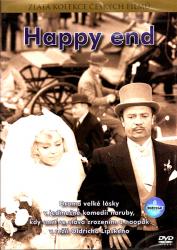
(Directed by Oldrich Lipský. 1966, Czechoslovakia)
The mid-1960's Czech "New Wave" produced some great directors like Jiri Menzel (Closely Watched Trains, Larks on a String); Milos Forman (The Loves of a Blonde, The Firemen's Ball), and Vera Chytilová, the director of the feminist film Daisies, a film remarkably ahead of its time. And then there is Oldrich Lipský, the director of, among other things, "Happy End", the first complete feature film to be filmed totally backwards, where even the dialogue is, yes, backwards.
Not to be confused with the musical Happy End by Bertolt Brecht/Kurt Weill, Lipsky's film is a bold conceptual experiment: a film where the entire mise-en-scene is shot backwards. Not only is the story backwards, the main actor recites in voice over an alternative story to the reversed story we are seeing: this film goes back and forth simultaneously. Or perhaps one of the greatest Dadaistic filmic experiments ever seen, who knows?
The story is a standard jealousy triangle between a butcher, his airheaded wife and the man who comes between them. Needless to say, it doesn't end happily but thanks to the magic of editing (and some silent movie type backwards gags), the film does end happily, hence the title.
The voice-over narration is completely and ridiculously in-sync with the alternate story: murder and death are reversed instead of proceeding in linear fashion: one sequence has the narrator explain (during a funeral) "That's when we planted Grandpa, but he came back" and, in the next scene Gramps is alive and well. The film itself is a curio and it's earthy humor doesn't lag at 71 minutes. For a surrealistic tour-de-force, Happy End delivers. Backwards.